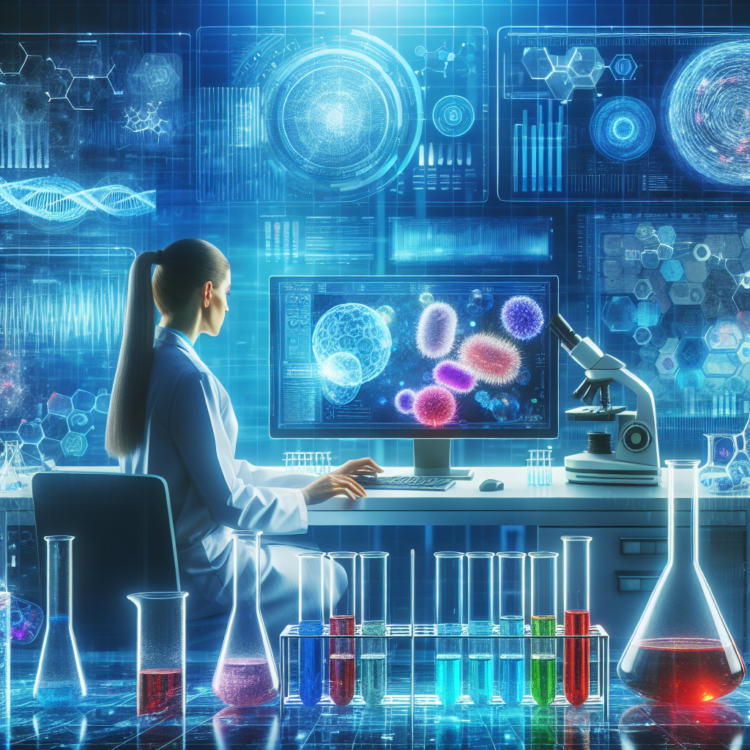Cleveland Clinic researchers developed an artficial intelligence (AI) model that can determine the best combination and timeline to use when prescribing drugs to treat a bacterial infection, based solely on how quickly the bacteria grow given certain perturbations. A team led by Jacob Scott, MD, PhD, and his lab in the Theory Division of Translational Hematology and Oncology, recently published their findings in PNAS.
Cleveland Clinic researchers developed an artficial intelligence (AI) model that can determine the best combination and timeline to use when prescribing drugs to treat a bacterial infection, based solely on how quickly the bacteria grow given certain perturbations. A team led by Jacob Scott, MD, PhD, and his lab in the Theory Division of Translational Hematology and Oncology, recently published their findings in PNAS.
Antibiotics are credited with increasing the average US lifespan by almost ten years. Treatment lowered fatality rates for health issues we now consider minor – like some cuts and injuries. But antibiotics aren’t working as well as they used to, in part because of widespread use.
“Health agencies worldwide agree that we’re entering a post-antibiotic era,” explains Dr. Scott. “If we don’t change how we go after bacteria, more people will die from antibiotic-resistant infections than from cancer by 2050.”
Bacteria replicate quickly, producing mutant offspring. Overusing antibiotics gives bacteria a chance to practice making mutations that resist treatment. Over time, the antibiotics kill all the susceptible bacteria, leaving behind only the stronger mutants that the antibiotics can’t kill.
One strategy physicians are using to modernize the way we treat bacterial infections is antibiotic cycling. Healthcare providers rotate between different antibiotics over specific time periods. Changing between different drugs gives bacteria less time to evolve resistance to any one class of antibiotic. Cycling can even make bacteria more susceptible to other antibiotics.
“Drug cycling shows a lot of promise in effectively treating diseases,” says study first author and medical student Davis Weaver, PhD. “The problem is that we don’t know the best way to do it. Nothing’s standardized between hospitals for which antibiotic to give, for how long and in what order.”
Study co-author Jeff Maltas, PhD, a postdoctoral fellow at Cleveland Clinic, uses computer models to predict how a bacterium’s resistance to one antibiotic will make it weaker to another. He teamed up with Dr. Weaver to see if data-driven models could predict drug cycling regimens that minimize antibiotic resistance and maximize antibiotic susceptibility, despite the random nature of how bacteria evolve.
Dr. Weaver led the charge to apply reinforcement learning to the drug cycling model, which teaches a computer to learn from its mistakes and successes to determine the best strategy to complete a task. This study is among the first to apply reinforcement learning to antibiotic cycling regiments, Drs. Weaver and Maltas say.
“Reinforcement learning is an ideal approach because you just need to know how quickly the bacteria are growing, which is relatively easy to determine,” explains Dr. Weaver. “There’s also room for human variations and errors. You don’t need to measure the growth rates perfectly down to the exact millisecond every time.”
The research team’s AI was able to figure out the most efficient antibiotic cycling plans to treat multiple strains of E. coli and prevent drug resistance. The study shows that AI can support complex decision-making like calculating antibiotic treatment schedules, Dr. Maltas says.
Dr. Weaver explains that in addition to managing an individual patient’s infection, the team’s AI model can inform how hospitals treat infections across the board. He and his research team are also working to expand their work beyond bacterial infections into other deadly diseases.
“This idea isn’t limited to bacteria, it can be applied to anything that can evolve treatment resistance,” he says. “In the future we believe these types of AI can be used to to manage drug-resistant cancers, too.”
Journal
Proceedings of the National Academy of Sciences
Article Title
Reinforcement learning informs optimal treatment strategies to limit antibiotic resistance
Article Publication Date
12-Apr-2024




